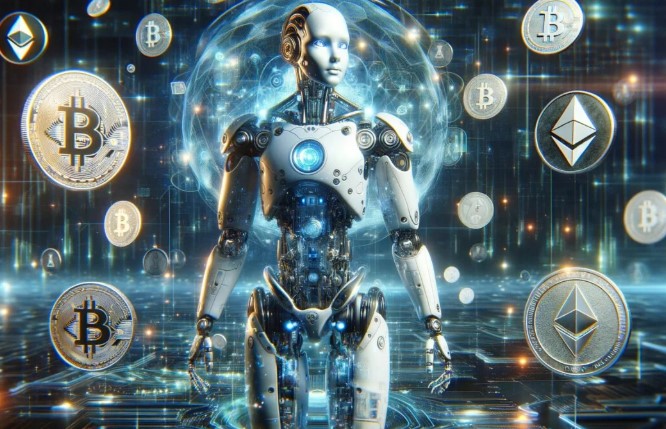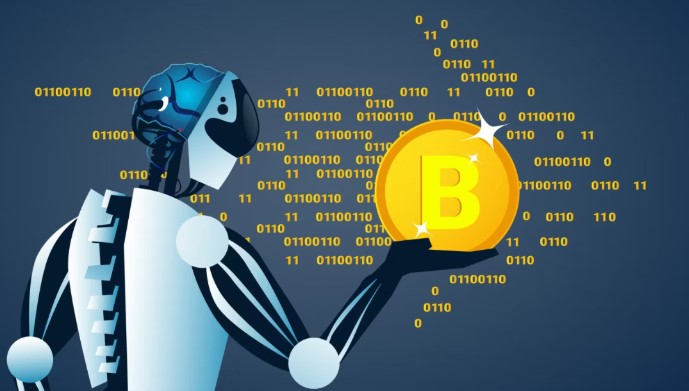Discover how AI and blockchain are converging in 2025—from smarter DeFi to AI-powered trading bots and decentralized intelligence networks.
Crypto and AI: How Artificial Intelligence Is Shaping the Future of Blockchain
In 2025, two of the most powerful technologies—blockchain and artificial intelligence—are no longer evolving separately. Instead, they’re converging in ways that are reshaping finance, security, infrastructure, and even the way humans interact with digital assets.
From AI-powered DeFi to on-chain governance algorithms, the synergy between crypto and AI is more than a trend—it’s the foundation of Web3’s next era.
Let’s explore how AI is influencing the crypto world, and where this hybrid evolution is heading.
- AI-Powered Trading: Bots Are Smarter Than Ever
In 2025, algorithmic trading in the crypto market is practically dominated by AI-powered bots. Unlike the rigid bots of the past, today’s tools can:
Analyze real-time sentiment across Twitter, Reddit, and news sites
Predict market volatility with high accuracy using historical and live data
Self-optimize by learning from each trade (machine learning in action)
Platforms like Numerai, Kryll, and GNY.io are giving even non-technical traders access to AI-enhanced strategies.
The result?
Retail investors and institutions alike are relying on AI to gain an edge in highly volatile markets.

- Smarter DeFi: AI Makes Protocols More Efficient
DeFi platforms are now using AI to:
Optimize yield farming strategies in real time
Detect suspicious activity (fraud, rug pulls, etc.) before damage is done
Automate rebalancing and asset management in liquidity pools
Example:
Yield optimization platforms like Zapper and Harvest Finance have integrated AI agents that assess hundreds of yield opportunities across protocols like Aave, Compound, and Curve—so users always get the best return with the lowest risk.
- AI in On-Chain Governance
Governance tokens and DAOs used to rely on basic voting models. Now, with AI:
Voting trends are analyzed to suggest better proposal language
AI bots moderate forums and filter spam or malicious actors
AI simulations test the potential impact of proposals before voting occurs
Projects like SingularityNET and DeepDAO are pioneering this hybrid of human decision-making and machine insight.
- Deepfake Defense and Identity Security
As deepfake technology becomes more convincing, Web3 platforms must fight back with equally powerful tools.
Blockchain startups are building AI-powered biometric ID tools that:
Analyze voice, facial expressions, and behavioral patterns
Detect synthetic identities or spoofing attempts
Offer decentralized identity (DID) verification tied to NFTs or smart contracts
Why it matters:
Airdrop farms, fake KYC profiles, and Sybil attacks are a massive drain on crypto platforms. AI is now the frontline defense.
- Decentralized AI Marketplaces: Data as a Token
Projects like Ocean Protocol, Fetch.ai, and SingularityNET are creating decentralized marketplaces where:
AI developers can sell models or training data
Enterprises can buy decentralized computation power
Communities can govern how their data is used and monetized
Instead of handing your data to Big Tech, you can tokenize it—and profit from it.
- Predictive Analytics in Crypto Risk Management
Insurance platforms, exchanges, and hedge funds are using AI to:
Identify wallet behaviors that indicate scam risks
Predict flash loan attack vectors or smart contract exploits
Assess borrower risk in undercollateralized DeFi lending protocols
Think of it as Web3 risk underwriting—only faster, smarter, and blockchain-native.
- Generative AI Meets NFTs
While many thought NFTs were fading, AI has brought them back to life:
AI-generated art collections are now curated by collectors and DAOs
Interactive NFTs adapt to user inputs or real-world data
Entire NFT universes are created procedurally with generative algorithms
Platforms like Art Blocks, Alethea AI, and Altered State Machine are leading the way.
- Challenges and Risks of AI in Crypto
As exciting as this future is, the integration of AI into blockchain also introduces challenges:
Bias in AI models can affect DeFi outcomes or governance
Malicious AI agents can exploit smart contracts or manipulate communities

Data ownership and privacy concerns grow with large AI models analyzing chain behavior
The solution?
Transparent models, open governance, and decentralized access to AI resources.
- Real-World Use Case: AI + Crypto + Climate
Projects like Toucan Protocol and Open Forest Protocol are combining blockchain with AI to:
Monitor forest health using satellite and drone data
Tokenize verified carbon credits
Predict and optimize reforestation strategies
It’s a powerful demonstration of how AI in crypto can solve real-world problems—not just speculative ones. Also Read>>>>
Final Thoughts: The Convergence Has Just Begun
AI and crypto aren’t just coexisting—they’re co-evolving. As we enter the second half of 2025, the fusion of machine learning and decentralized systems is shaping:
Smarter financial products
Safer identity systems
Fairer governance tools
More personalized user experiences
Whether you’re an investor, developer, or Web3 user, staying ahead means understanding how AI is driving crypto innovation—and how blockchain is keeping AI honest, open, and decentralized.
Curious about integrating AI into your crypto project? Follow our newsletter for weekly updates, case studies, and hands-on tools you can start using today.





